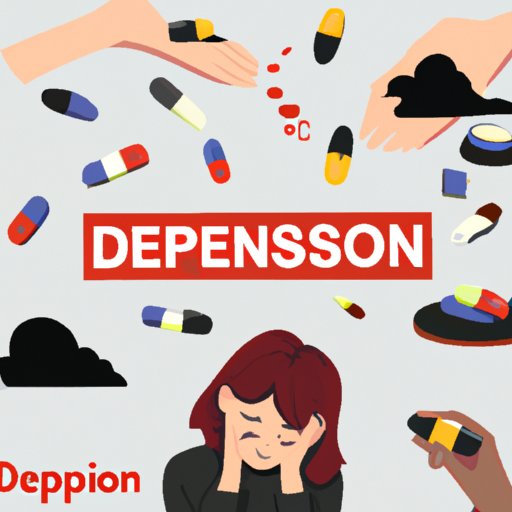
Introduction
Depression is a common mental health issue that can have a significant impact on a person’s life. It is important to recognize the signs of depression so that individuals can seek help and support. In this article, we will explore the signs and symptoms of depression, the importance of seeking help, and strategies for coping with this mental health condition.
10 Signs That You Are Experiencing Depression
Depression can present in many different ways, and the symptoms can vary from person to person. However, there are some common signs and symptoms of depression that are worth knowing:
- Feelings of sadness or hopelessness
- Lack of interest in activities you used to enjoy
- Fatigue or lack of energy
- Changes in appetite or weight
- Difficulty sleeping or sleeping too much
- Difficulty concentrating or making decisions
- Feelings of worthlessness or guilt
- Physical symptoms such as headaches or digestive issues
- Withdrawal from social activities or relationships
- Thoughts of death or suicide
If you are experiencing any of these symptoms, it’s important to seek professional help.
The Importance of Seeking Help: Recognizing the Symptoms of Depression
Recognizing the symptoms of depression is crucial for seeking help. Early intervention can positively impact recovery. Seeking professional help can provide strategies and support to manage depression symptoms. There are many options for seeking help, including therapy, medication, and support groups.
Therapy is a common treatment for depression. It can help individuals identify and change negative thought patterns, manage stress, and improve relationships. Medication can also be effective in managing depression symptoms. Support groups can provide individuals with a sense of community and support.
The Hidden Signs of Depression: 5 Things You Should Know
Depression can also present in more subtle ways that people may not recognize as symptoms at first. Here are five things you should know about the hidden signs of depression:
- Physical pain can be a symptom of depression
- Irritability and anger can be signs of depression, especially in men
- Memory loss and difficulty concentrating can also be symptoms of depression
- Changes in appetite or weight can be indicators of depression, regardless of whether it’s an increase or decrease
- Withdrawal from people and activities is not the only sign of depression. An inability to say “no” or being overly agreeable can also be a sign of depression.
If you are experiencing any of these symptoms, it’s important to talk to a medical professional.
Depression and You: Understanding the Warning Signs
Understanding the signs and symptoms of depression can help individuals recognize how depression may be affecting their daily life, relationships, and work. Depression can make it challenging to focus on daily tasks, enjoy activities that were once pleasurable, and have fulfilling relationships. Recognizing and seeking help can support individuals in managing symptoms and improving their quality of life.
Are You Struggling with Depression? Here’s How to Know for Sure
If you’re not sure whether you’re experiencing depression, here is a checklist of symptoms:
- Feeling sad or “empty” most of the day, nearly every day
- Loss of interest or pleasure in nearly all activities most of the day, nearly every day
- Significant weight loss or gain, or decrease or increase in appetite almost every day
- Difficulty sleeping or sleeping too much almost every day
- Feeling restless or irritable nearly every day
- Fatigue or loss of energy nearly every day
- Difficulty thinking, concentrating, or making decisions nearly every day
- Feelings of worthlessness or excessive guilt nearly every day
- Recurrent thoughts of death, recurrent suicidal ideation without a specific plan, or a suicide attempt or a specific plan for committing suicide
It’s important to remember that experiencing one or two of these symptoms does not necessarily mean you are struggling with depression. However, if you are experiencing many of these symptoms, it’s important to talk to a medical professional.
Exploring the Link between Stress and Depression: What You Need to Know
Stress can trigger and worsen symptoms of depression. For some individuals, stress can also contribute to the development of depression. Here are some strategies to manage stress and reduce the risk of depression:
- Practice relaxation techniques such as mindfulness, deep breathing, or yoga
- Exercise regularly to reduce stress and improve mood
- Connect with loved ones for support and to share concerns
- Take time for activities you enjoy and that reduce stress, such as reading or listening to music
- Seek professional help if you are experiencing stress and any symptoms of depression.
Conclusion
Depression is a common mental health issue that can have a significant impact on a person’s life. Recognizing the signs and symptoms of depression is crucial for seeking help early. Seeking help, including therapy, medication, and support groups, can provide strategies and support to manage depression symptoms. Don’t be afraid to reach out for help, there are many resources available, including helplines and online support.
If you or someone you know is experiencing depression, it’s important to seek help. Remember, there is always hope and support available.





